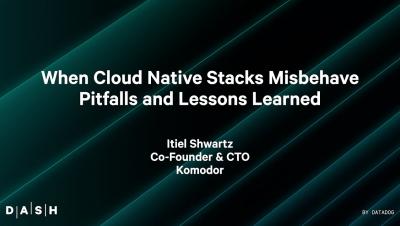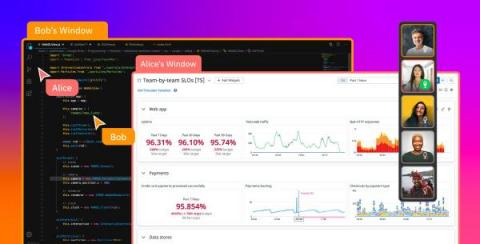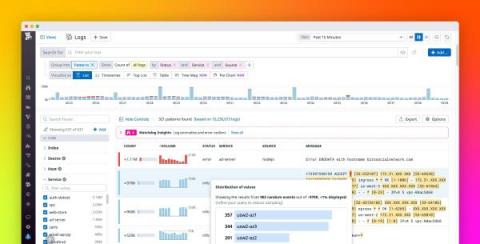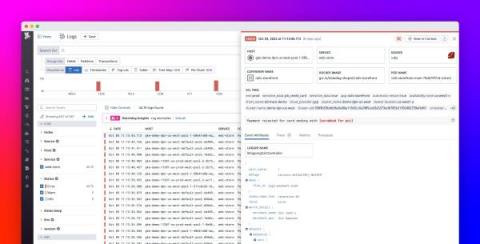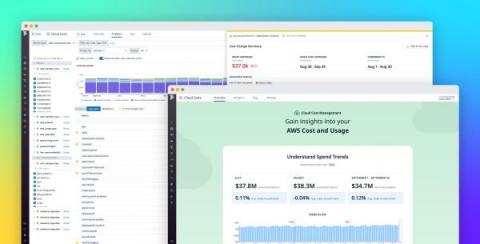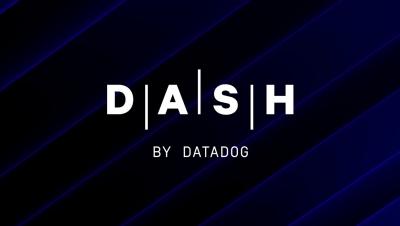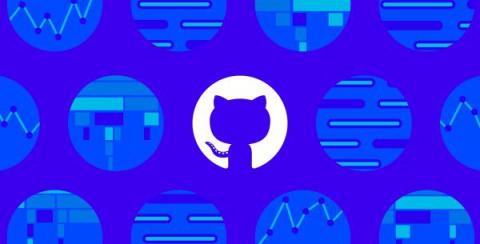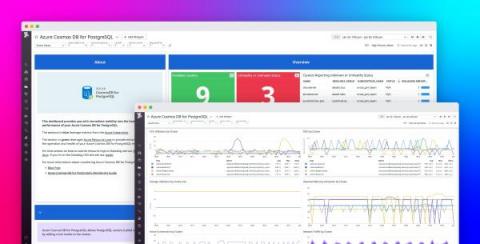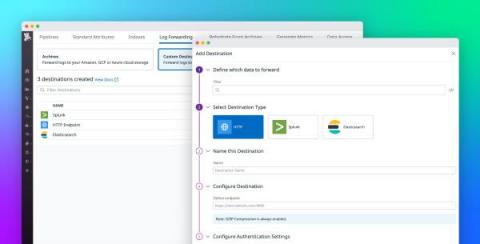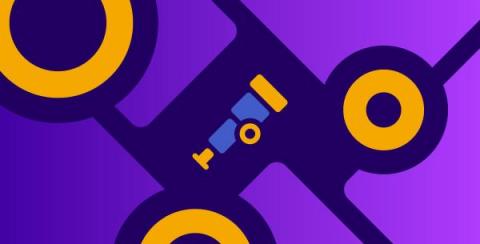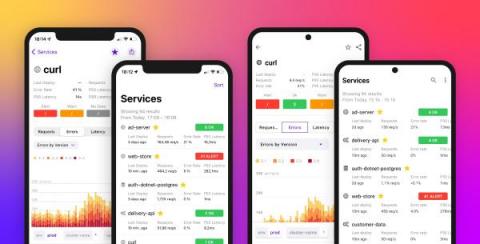Operations | Monitoring | ITSM | DevOps | Cloud
October 2022
Showcase dashboards securely and effortlessly with Skykit's offering in the Datadog Marketplace
For many organizations, making the most of the visibility Datadog offers into the health and performance of their infrastructure means displaying dashboards to stakeholders in various settings continuously and in real time. But the standard solutions for sharing dashboards to large-format displays can be onerous, involving sundry software and hardware and restrictive manual setups. These solutions can also pose significant security risks, since they tend to involve sharing passwords or devices.
Best practices for network perimeter security in cloud-native environments
Cloud-native infrastructure has become the standard for deploying applications that are performant and readily available to a globally distributed user base. While this has enabled organizations to quickly adapt to the demands of modern app users, the rapid nature of this migration has also made cloud resources a primary target for security threats.
When Cloud Native Stacks Misbehave - Pitfalls and Lessons Learned | Itiel Shwartz (Komodor)
Bringing "Blameless" to Traffic Court | J. Paul Reed (Release Engineering Approaches)
Use Datadog Continuous Testing to release with confidence
Testing early and often in the development cycle is a must for ensuring that your application meets user expectations. Poor performance and errors can alienate users and prevent you from meeting crucial benchmarks and OKRs. Additionally, having to constantly implement fixes after new, under-tested features are added can fatigue developers and strain your resources, making your organization less nimble overall.
Leverage collaborative screen sharing with Datadog CoScreen
Remote collaboration tools have transformed how remote and hybrid teams work synchronously. But while the current popular chat forum and video conferencing solutions are inarguably helpful, few were created with software development and operations in mind. CoScreen is the only real-time collaboration tool designed specifically for remote and hybrid engineering teams that integrate both interactive screen sharing and video conferencing features.
Identify and redact sensitive data in APM, RUM, and Events stream with Sensitive Data Scanner
Customer-facing applications request and process many types of sensitive data, such as API keys, credit card numbers, and email addresses. As your application scales in size and complexity, it becomes harder to keep track of this sensitive data moving across more services, increasing the risk of data leaks.
Announcing PCI-Compliant Log Management and APM from Datadog
For any organization that stores, processes, or transmits cardholder data, monitoring can pose a particular set of challenges. The Payment Card Industry (PCI) Data Security Standard (DSS) dictates rigorous monitoring and data security requirements for the cardholder data environments (CDEs) of all merchants, service providers, and financial institutions.
Gain visibility and control of your cloud spend with Datadog Cloud Cost Management
To optimize its cloud investments, your organization needs internal stakeholders to act on shared knowledge about its cloud costs and cloud usage. But in practice, it’s difficult for organizations to gain a high degree of clarity about their cloud spending. The factors contributing to cost data are not normally visible to all stakeholders, and it’s often impossible to attribute costs to the teams, services, and applications that incurred them.
Dash 2022: Guide to Datadog's newest announcements
Today at Dash 2022, we announced new products and features that enable your teams to break down information silos, shift testing to the left, monitor cloud and application security, and more. Now, you can analyze cloud cost data alongside other telemetry, create synthetic tests for your mobile applications, and prevent malicious activity in your environment by blocking IPs directly from Datadog. We expanded Sensitive Data Scanner to include APM, RUM, and Events stream data.
Dash 2022 Keynote
Collect GitHub audit logs and scanning alerts with Datadog
For most organizations, GitHub is mission critical. Your GitHub repositories likely also contain some of your organization’s most sensitive data. GitHub provides tools to help you protect and govern this data, with tools such as audit logs, code scanning alerts, and secret scanning alerts. However, analyzing these logs and alerts through GitHub’s UI can be challenging. For example, looking for trends in your code scanning alerts over time through GitHub’s UI is just not possible.
Monitor Azure Cosmos DB for PosgreSQL with Datadog
Azure Cosmos DB for PostgreSQL is a fully managed relational database service for PostgreSQL that is powered by the open source Citus extension. With remote query execution and support for JSON-B, geospatial data, rich indexing, and high-performance scale-out, Cosmos DB for PostgreSQL enables users to build applications on single- or multi-node clusters.
Route logs to third-party systems with Datadog Log Forwarding
Large organizations often rely on multiple monitoring tools, security platforms, and auditing systems to meet the diverse needs of their observability, security, engineering, and compliance teams. Because these teams may use the same logs for many different use cases—including detecting potential threats or breaches, troubleshooting errors, and gauging the effectiveness of new features—it can be difficult to effectively standardize and route data.
Discover the values behind log patterns with Pattern Inspector
Whether you’re rushing to troubleshoot an incident or proactively performing a security audit, the trial-and-error process of searching through millions of logs for key information can be time-consuming and cumbersome. To help you quickly surface important details from large swaths of log data, Datadog’s Log Explorer allows you to search and filter your logs, create visualizations, as well as group your logs by fields, patterns, or transactions.
Send metrics and traces from OpenTelemetry Collector to Datadog via Datadog Exporter
OpenTelemetry is an open source, vendor-neutral observability framework that provides tools, APIs, and SDKs to collect and standardize telemetry data from cloud-native applications and services. One of OpenTelemetry’s key components is the OpenTelemetry Collector, which receives and processes data before using exporters to route it to the destinations of your choice.
Forward logs from the OpenTelemetry Collector with the Datadog Exporter
OpenTelemetry is an open source set of tools and standards that provide visibility into cloud-native applications. OpenTelemetry allows you to collect metrics, traces, and logs from applications written in many languages and export them to a backend of your choice.
Collect traces, logs, and custom metrics from your Google Cloud Run services with Datadog
Google Cloud Run is a managed platform for the deployment, management, and scaling of workloads using serverless containers. You can deploy workloads in the cloud or, using Cloud Run for Anthos, on your on-prem infrastructure.
Datadog on gRPC
Monitor Workday with AVM Consulting's integration in the Datadog Marketplace
Workday is a cloud-native solution for enterprise management. With its multitenant architecture, which supports a wide range of integrations and enables centralized administration of multiple Workday instances (i.e., tenants), Workday provides a unitary framework for managing human resources, financials, payroll, recruiting, analytics, and more. Along with Workday’s cloud-based delivery model, this multifaceted support offers flexibility that can be critical at enterprise scale.
Monitor application performance from the Datadog mobile app
When you’re on-call for a critical service and get alerted to an issue that could impact customers, you need quick access to key performance metrics in order to effectively troubleshoot. But all too often, digging into this data requires you to switch from your mobile device to a laptop, restricting your ability to troubleshoot on the go and disrupting your routine.





